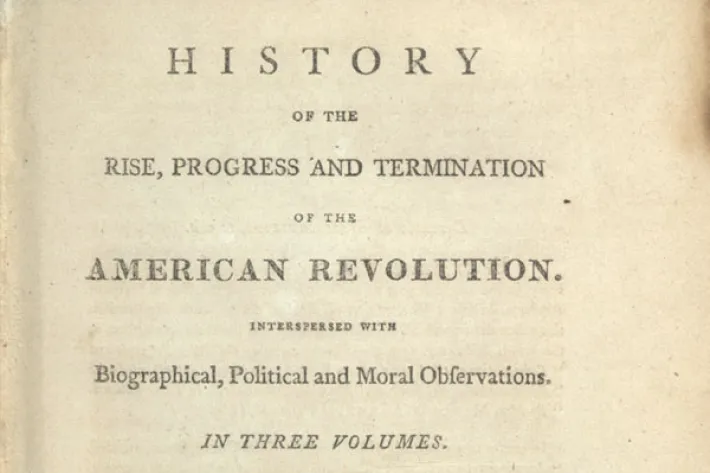Mercy Otis Warren on Hamilton’s Economic Plan, 1805

Title page of Mercy Otis Warren's History of the Rise, Progress and Termination of the American Revolution.
In this passage from the third and final volume of her history of the American Revolution, Warren describes the impact of Alexander Hamilton’s controversial economic plan on the new nation, and extols Washington’s virtues as the first President of the United States.
Excerpts from Mercy Otis Warren’s History of the Rise, Progress and Termination of the American Revolution, 1805
The spirit of finance, which, a sensible writer observes, “accumulates woes on the head of a people, by stripping them of the means of subsistence, and what is infinitely more to be regretted, saps the foundations of morality,” had heretofore been only the dream of some overgrown public creditor. A funding system afterwards introduced, attended with all the intricacies of more aged financiers, which never could be understood, and a public debt thereby enhanced, which was probably never intended to be paid, was impregnated in the brain of a young officer* of foreign extraction, an adventurer of a bold genius, active talents, and fortunate combinations, from his birth to the exalted station to which he was lifted by the spirit of favoritism in American arrangements. Yet when the system appeared, it was embraced with warmth by a considerable class, as the legitimate child of speculation. But it appeared a monster in the eye of a very large part of the community, who viewed it as the parent of a national debt that would hang on the neck of America to the latest generations. Hence, a train of restless passions were awakened, that excited to activity, and created a rage for project, speculation, and various artifices, to support a factitious dignity, which finally ruined multitudes of unsuspecting citizens. Hence a spirit of public gambling, speculation in paper, in lands, in every thing else, to a degree unparalleled in any nation. Many other contingencies were felt too severely to require a particular specification. When general Washington was placed in the presidential chair, he doubtless felt all the solicitude for the discharge of his duty, which such a sacred deposite entrusted to his integrity would naturally awaken. His own reputation was blended with the administration of government on those principles of republicanism, which he had always professed, and which he had supported by his sword; while time, circumstances and interests had changed the opinions of many influential characters. Thus, the favored and beloved Washington, called from his first retirement to act as chief magistrate in the administration of civil government, whatever measures he sanctioned, were considered as the best, the wisest, and most just, by a great majority of the people. In most instances, it is true, he presided with wisdom, dignity, and moderation, but complete perfection is not to be attributed to man. Undue prejudices and partialities often imperceptibly creep into the best of hearts; and with all the veneration due to so meritorious a character, there were many who thought him too much under the influence of military favorites.
*Alexander Hamilton.
Source: Mercy Otis Warren, History of the Rise, Progress and Termination of the American Revolution, 3 vols. (Boston, 1805), vol. 3, pp. 372–373.
Mercy Otis Warren’s History of the Rise, Progress and Termination of the American Revolution, 1805
The spirit of finance, which, a sensible writer observes, “accumulates woes on the head of a people, by stripping them of the means of subsistence, and what is infinitely more to be regretted, saps the foundations of morality,” had heretofore been only the dream of some overgrown public creditor. A funding system afterwards introduced…which never could be understood, and a public debt …, which was probably never intended to be paid, was impregnated in the brain of a young officer* of foreign extraction, an adventurer of a bold genius, active talents, and fortunate combinations, from his birth to the exalted station to which he was lifted by the spirit of favoritism . . . Yet when the system appeared, it was embraced with warmth by a considerable class, as the legitimate child of speculation. But it appeared a monster in the eye of a very large part of the community, who viewed it as the parent of a national debt that would hang on the neck of America to the latest generations. . . .
When general Washington was placed in the presidential chair, he doubtless felt all the solicitude for the discharge of his duty . . .
Thus, the favored and beloved Washington, called from his first retirement to act as chief magistrate, . . . whatever measures he sanctioned, were considered as the best, the wisest, and most just, by a great majority of the people. In most instances, it is true, he presided with wisdom, dignity, and moderation, but complete perfection is not to be attributed to man. Undue prejudices and partialities often imperceptibly creep into the best of hearts; and with all the veneration due to so meritorious a character, there were many who thought him too much under the influence of military favorites.
Source: Mercy Otis Warren, History of the Rise, Progress and Termination of the American Revolution, 3 vols. (Boston, 1805), vol. 3, pp. 372–373.
impregnated – placed in
extraction – origin of birth
speculation – investment with the hope of gain
solicitude – care or concern
veneration – great respect
Background
In this passage from the third and final volume of her history of the American Revolution, Warren describes the impact of Alexander Hamilton’s controversial economic plan on the new nation, and extols Washington’s virtues as the first President of the United States.
Transcript
Excerpts from Mercy Otis Warren’s History of the Rise, Progress and Termination of the American Revolution, 1805
The spirit of finance, which, a sensible writer observes, “accumulates woes on the head of a people, by stripping them of the means of subsistence, and what is infinitely more to be regretted, saps the foundations of morality,” had heretofore been only the dream of some overgrown public creditor. A funding system afterwards introduced, attended with all the intricacies of more aged financiers, which never could be understood, and a public debt thereby enhanced, which was probably never intended to be paid, was impregnated in the brain of a young officer* of foreign extraction, an adventurer of a bold genius, active talents, and fortunate combinations, from his birth to the exalted station to which he was lifted by the spirit of favoritism in American arrangements. Yet when the system appeared, it was embraced with warmth by a considerable class, as the legitimate child of speculation. But it appeared a monster in the eye of a very large part of the community, who viewed it as the parent of a national debt that would hang on the neck of America to the latest generations. Hence, a train of restless passions were awakened, that excited to activity, and created a rage for project, speculation, and various artifices, to support a factitious dignity, which finally ruined multitudes of unsuspecting citizens. Hence a spirit of public gambling, speculation in paper, in lands, in every thing else, to a degree unparalleled in any nation. Many other contingencies were felt too severely to require a particular specification. When general Washington was placed in the presidential chair, he doubtless felt all the solicitude for the discharge of his duty, which such a sacred deposite entrusted to his integrity would naturally awaken. His own reputation was blended with the administration of government on those principles of republicanism, which he had always professed, and which he had supported by his sword; while time, circumstances and interests had changed the opinions of many influential characters. Thus, the favored and beloved Washington, called from his first retirement to act as chief magistrate in the administration of civil government, whatever measures he sanctioned, were considered as the best, the wisest, and most just, by a great majority of the people. In most instances, it is true, he presided with wisdom, dignity, and moderation, but complete perfection is not to be attributed to man. Undue prejudices and partialities often imperceptibly creep into the best of hearts; and with all the veneration due to so meritorious a character, there were many who thought him too much under the influence of military favorites.
*Alexander Hamilton.
Source: Mercy Otis Warren, History of the Rise, Progress and Termination of the American Revolution, 3 vols. (Boston, 1805), vol. 3, pp. 372–373.
Excerpt
Mercy Otis Warren’s History of the Rise, Progress and Termination of the American Revolution, 1805
The spirit of finance, which, a sensible writer observes, “accumulates woes on the head of a people, by stripping them of the means of subsistence, and what is infinitely more to be regretted, saps the foundations of morality,” had heretofore been only the dream of some overgrown public creditor. A funding system afterwards introduced…which never could be understood, and a public debt …, which was probably never intended to be paid, was impregnated in the brain of a young officer* of foreign extraction, an adventurer of a bold genius, active talents, and fortunate combinations, from his birth to the exalted station to which he was lifted by the spirit of favoritism . . . Yet when the system appeared, it was embraced with warmth by a considerable class, as the legitimate child of speculation. But it appeared a monster in the eye of a very large part of the community, who viewed it as the parent of a national debt that would hang on the neck of America to the latest generations. . . .
When general Washington was placed in the presidential chair, he doubtless felt all the solicitude for the discharge of his duty . . .
Thus, the favored and beloved Washington, called from his first retirement to act as chief magistrate, . . . whatever measures he sanctioned, were considered as the best, the wisest, and most just, by a great majority of the people. In most instances, it is true, he presided with wisdom, dignity, and moderation, but complete perfection is not to be attributed to man. Undue prejudices and partialities often imperceptibly creep into the best of hearts; and with all the veneration due to so meritorious a character, there were many who thought him too much under the influence of military favorites.
Source: Mercy Otis Warren, History of the Rise, Progress and Termination of the American Revolution, 3 vols. (Boston, 1805), vol. 3, pp. 372–373.
impregnated – placed in
extraction – origin of birth
speculation – investment with the hope of gain
solicitude – care or concern
veneration – great respect
